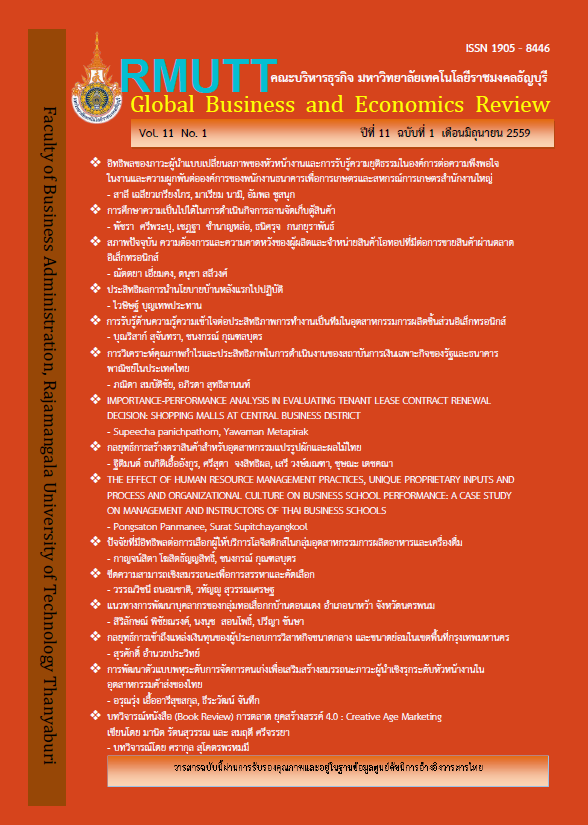ANALYSIS OF EARNINGS QUALITY AND OPERATING EFFICIENCY OF SPECIFIC FINANCIAL INSTITUTIONS (SFLS) AND COMMERCIAL BANKS IN THAILAND
Keywords:
Earnings Quality, Operating EfficiencyAbstract
The purpose of this research study was to analyze the earnings quality and operating efficiency of the Specific Financial Institutions (SFIs) and commercial banks in Thailand. The study was conducted by analyzing information from financial statements since 2007-2011, annual reports, and other related documents from the samples of 6 SFIs and 14 commercial banks. Techniques used for the analysis of earnings quality included finding signals, evaluating the effects of accounting policy toward the quality of earnings, management appraisal, financial ratio analysis, cash flow ratio analysis, and measurement of the variation and the investment risk. Operating efficiency was measured by using financial ratios. Statistics used for the hypothesis testing was Paired Samples t-test. The results of the earnings quality analysis revealed that three techniques which positively affected the earnings quality consisted of evaluating the effects of accounting policy toward the quality of earnings, financial ratio analysis, and measurement of the variation and the investment risk. Meanwhile, the other three techniques which negatively affected the earnings quality included finding signals, management appraisal, and cash flow ratio analysis. Due to the analysis of efficiency, the results showed that the overall operating efficiency of the Banks was good indicating they were able to get cash from operation a lot comparing to revenues, interest and dividend, and asset investment. This was except some small and medium commercial banks whose efficiency tended to decrease. Besides, depreciation and amortization was good as an overall but appeared to decrease in terms of investment. Moreover, the earnings quality and the operating efficiency were significantly different depending on sizes of the commercial banks at a significant level of 0.05.
References
จารุวรรณ ขันธอุบล. (2551). การวิเคราะห์คุณภาพกำไรของธุรกิจโรงแรมในตลาดหลักทรัพย์แห่งประเทศไทย. (การค้นคว้าอิสระปริญญามหาบัณฑิต, มหาวิทยาลัยเชียงใหม่).
ชญานุช คลังวิเชียร. (2553). การวิเคราะห์คุณภาพกำไรของกลุ่มธุรกิจอุตสาหกรรมยานยนต์ในตลาดหลักทรัพย์แห่งประเทศไทย. (การค้นคว้าอิสระปริญญามหาบัณฑิต, มหาวิทยาลัยศรีปทุม).
ธนาคารพัฒนาวิสาหกิจขนาดกลางและขนาดย่อมแห่งประเทศไทย. (2545). พระราชบัญญัติธนาคารพัฒนาวิสาหกิจขนาดกลางและขนาดย่อมแห่งประเทศไทย. สืบค้นจาก http://www.smebank.co.th/th/parliaments.php
ธนาคารเพื่อการเกษตรและสหกรณ์การเกษตร. (2555). รายงานการเงินประจำปี. สืบค้นจาก http://www.baac.or.th/content-report.php?content_group_sub=1
ธนาคารแห่งประเทศไทย. (2555). พระราชบัญญัติธุรกิจสถาบันการเงิน. สืบค้นจาก http://www.bot.or.th/Thai/LawsAndRegulations/Pages/Law_3.aspx
ธนาคารออมสิน. (2489). พระราชบัญญัติธนาคารออมสิน. สืบค้นจาก http://www.gsb.or.th/about/prb.php
ธนาคารอาคารสงเคราะห์. (2549). พระราชบัญญัติธนาคารอาคารสงเคราะห์. สืบค้นจาก http://www.ghb.co.th
ธนาคารอิสลามแห่งประเทศไทย. (2545). พระราชบัญญัติธนาคารอิสลามแห่งประเทศไทย. สืบค้นจาก http://www.ibank.co.th/FileUpload/fck/file/about/NPG1-15.pdf
บุษบา ว่องพรรณงาม. (2543). การหาความสัมพันธ์ระหว่างคุณภาพกำไรกับขนาดของธนาคารพาณิชย์ไทย. (วิทยานิพนธ์ปริญญามหาบัณฑิต, มหาวิทยาลัยธุรกิจบัณฑิตย์).
วรศักดิ์ ทุมมานนท์. (2543). คุณรู้จัก Creative Accounting และคุณภาพกำไรแล้วหรือยัง?. กรุงเทพฯ: ไอโอนิคอินเตอร์เทรค รีซอสเซส.
สร้อยเพชร สุขเสริม. (2550). การวิเคราะห์คุณภาพกำไรของธนาคารของรัฐ. (การค้นคว้าอิสระปริญญา มหาบัณฑิต, มหาวิทยาลัยเชียงใหม่).
สำนักงานคณะกรรมการกำกับหลักทรัพย์และตลาดหลักทรัพย์แห่งประเทศไทย. (2555). งบการเงิน. สืบค้นจาก http://www.sec.or.th
อรฤดี ศรีธราพิพัฒน์. (2550, กรกฎาคม-กันยายน). คุณภาพกำไรและประสิทธิภาพในการดำเนินงานของธนาคารพาณิชย์ไทย. วารสารวิชาการมหาวิทยาลัยหอการค้าไทย, 28 (3) : 57-78.
White, L., Sondhi, C. A. & Fried, D. (2002). The analysis and use of financial statements 3rd ed. New York: Willey.
Downloads
Published
How to Cite
Issue
Section
License
The articles published in this journal are the intellectual property of their respective authors.
The views and opinions expressed in each article are solely those of the individual authors and do not reflect the positions of Rajamangala University of Technology Thanyaburi or any of its faculty members. All components and content of each article are the sole responsibility of the respective authors. In the event of any errors, the authors shall bear full responsibility for their own work.








